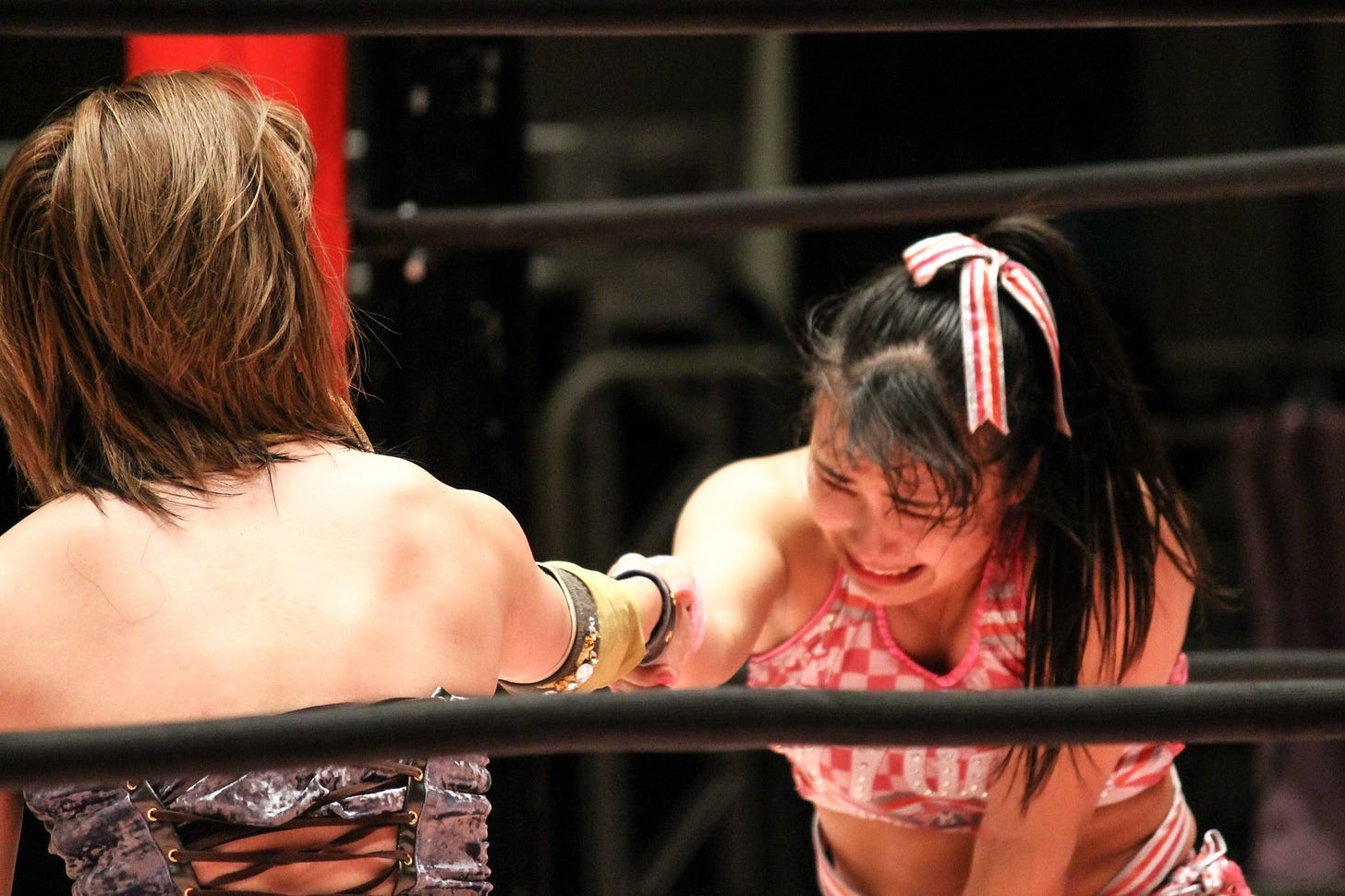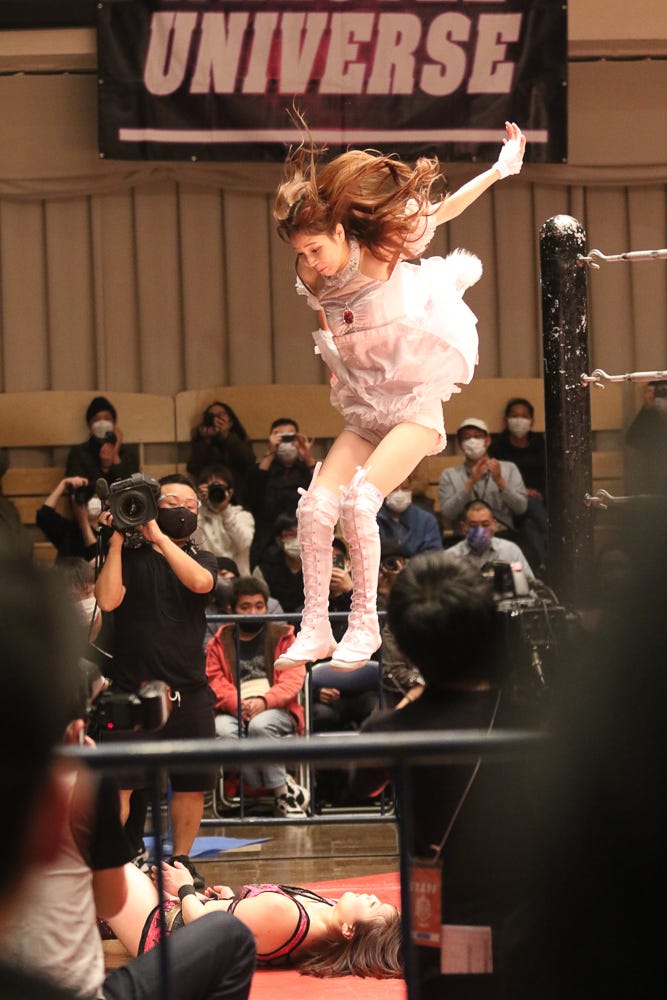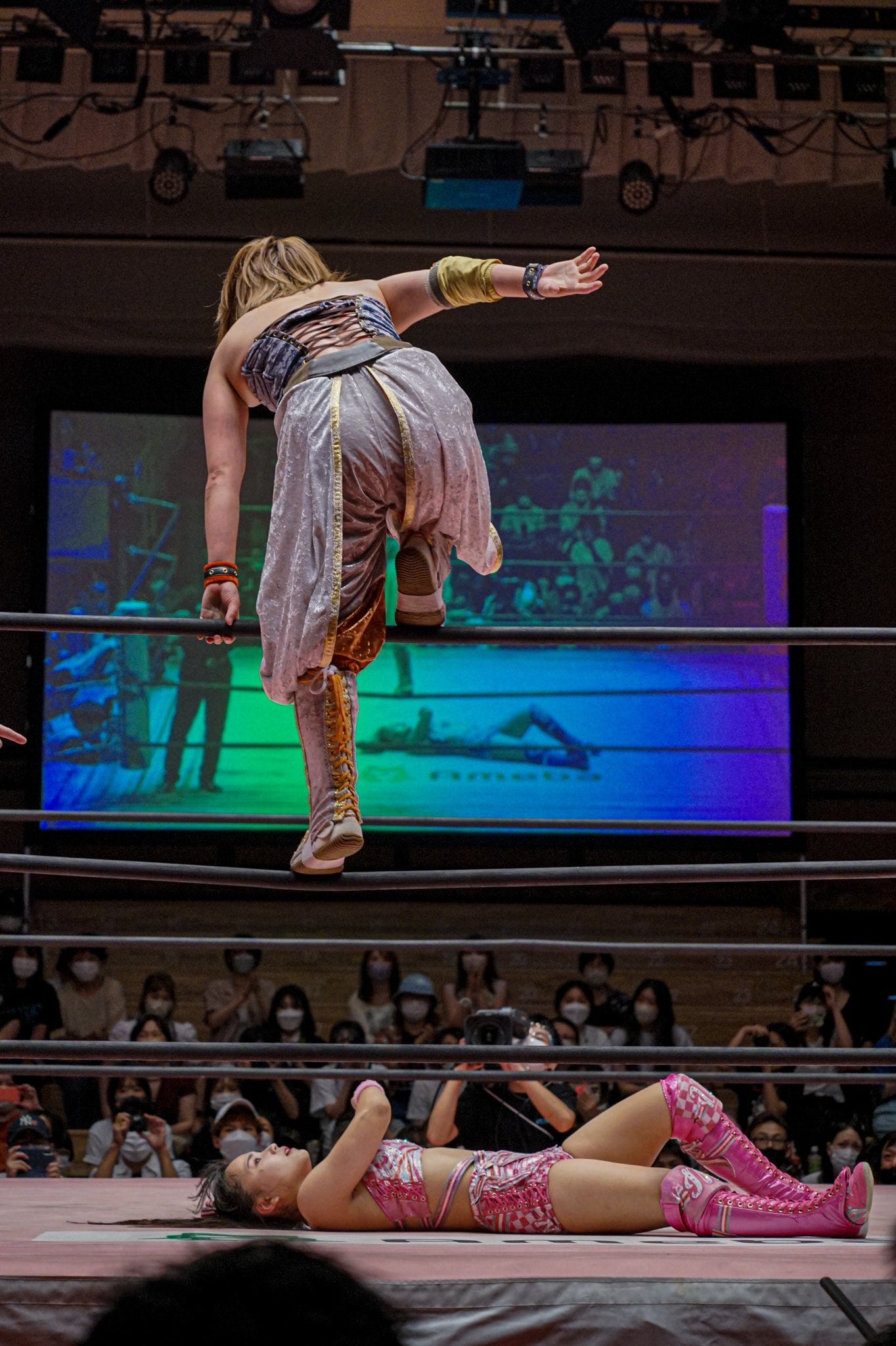Front Matter
Each image used in this newsletter is linked to the Twitter account responsible for it: simply click through to bring up the original post. If you are a photographer whose image I have used here, and you do not grant me permission to reproduce your work, please let me know (Twitter: @FlupkeDiFlupke) and I will remove it. Thanks!
写真家さん、ここにイメージが写すことが許可しなければ聞いて下さって私は大至急除きます (ツイターの @flupkediflupke です)。ありがとうございます!
Subscribe for free to receive Flupke’s Month in Wrestling every month in your inbox, or donate $5 a month to access the full archive. A portion of every subscription supports Amazon Frontlines, an organisation dedicated to working with Indigenous peoples to defend their way of life, the Amazon rainforest, and our climate future.
Miyu Yamashita vs. Mizuki
04.01 / TJPW Tokyo Joshi Pro ‘22 / Korakuen Hall
Yuka Sakazaki vs. Miu Watanabe
14.08 / TJPW Princess Cup ‘22 (Day 7) / Korakuen Hall
Everywhere you looked in joshi in 2022, all was in flux - everywhere, that is, except Tokyo Joshi Pro. George wrote on here last month about the surprising extent to which this idol promotion is the natural heir to the King’s Road storytelling model which underpinned All Japan Pro Wrestling’s golden age in the 1990s and late 1980s. All the key points that George drew out in that piece - the importance of hierarchy, the emphasis on collegiality and on individuals raising the standards of the promotion’s in-ring output by constantly testing themselves against the stiffest odds - could just as easily have been made about the Tokyo Joshi we saw in 2018 as the one we saw this year. We’re on a long, long road, with no easy or complete resolution in sight (and 2018, which began with the debut of the Up Up Girls and with the coronation of Miyu Yamashita as the first-ever multiple-time Princess of Princess Champion, can be seen as a starting point for the leg of the journey we’re currently walking). This sense of consistency is one of the things that made TJPW so uniquely watchable in a year where almost nothing else looked quite like it did at this point last year.
And yet. If Tokyo Joshi’s year was in large part defined by continuity, it was also undeniable that 2022 was a year marked by escalation, by breakthrough, by a sense of pushing forward and moving beyond. We’re on the same road, but the scenery around us looks subtly different, richer, more dramatic. Miyu’s title defence against Mizuki at Ittenyon was not the first time that either of these two have been involved in a great match for the Princess of Princess Championship. But it did feel as though Miyu and Mizuki managed to unlock some previously withheld level of greatness here, and in doing so they set a precedent for what was about to come - at Sumo Hall in March, at Saitama Super Arena in June, at Ota Ward Gymnasium in July, and at Tokyo Dome City Hall in October.
It feels slightly perverse to choose two matches to represent TJPW’s title picture in 2022 that didn’t take place at one of these mega-arenas. Since 2020, we’ve moved from the three-Korakuens-a-year model to one where Korakuen shows are now commonplace, and the three “big” annual shows all take place in venues which clearly belong on the next rung of the ladder. But Korakuen Hall is still an engine room for TJPW’s story arcs, and these two matches encapsulated the promotion’s excellent year as well as anything that happened in front of an attendance exceeding 1000. If Miyu vs Mizuki was the ceremonial curtain-raiser for a year like no other, then Yuka Sakazaki vs Miu Watanabe was the single biggest emotional crescendo of the year, a match which every Tokyo Joshi fan felt deep in their gut, whether they agreed with the result or not.
This has been an eventful twelve months, a year of three champions, a year of multiple mega-shows, a year where the doors were re-opened to international talent and where chanting and streamers were allowed back, a year which saw Yuki Arai win gold and Suzume crowned as a strong fan favourite. It’s a little tricky after all of that to cast your mind back to January, but here’s where we were at - Miyu had recently defeated Maki Itoh at Wrestle Princess II, proving beyond any doubt that she’s an unflappable champion, able to rise above emotion and narrative and get the job done. In March she’d finally fail at all of this, and drop the belt to Shoko Nakajima, but in January she looked as strong a Miyu Yamashita as we’ve ever seen. Mizuki had exposed her achilles heel and pinned her in tag competition in November, however, so she came into this match with the air of someone who knows how to pin the seemingly unpinnable.
For almost the entire run of the match, Miyu and Mizuki go blow-for-blow. When Miyu lays Mizuki out with an Avalanche Attitude Adjustment, Mizuki responds in kind with a double foot-stomp from the top rope to the floor a few minutes later. The challenger never lets the frustration get the better of her, and she stays in the contest, holding her own at the highest level of combat. Once we cross the fifteen minutes mark, though, there’s a couple of moments where fortune deserts her. Mizuki has sustained some damage to her leg and she stumbles running out of the corner, which gives Miyu enough recovery and thinking-time to hit a German Suplex. Mizuki is looking to run the ropes, and takes her eyes off Miyu for one deadly second, and Miyu nails her with a Skull Kick. Neither of these moves succeeds in putting Mizuki down, but they’re enough to allow the champion to seize the advantage: before you know it, Mizuki is desperately clinging on to Miyu’s leg, delaying the inevitable.
It’s what happens next that carries this match beyond what we might already have come to expect from these two. The finish looks clearly at hand, but Mizuki still finds a way to fight back from this position of almost-certain defeat. The moment she hits that last-gasp Cutie Special is the moment I could pretty confidently claim that there’d never been a Princess of Princess title match as dramatic this. There’d never been a main event in this promotion that had reached this point, and then kept going. It ended very soon after, but it was enough. New levels of resilience and skill had been forcibly unboxed. Your mileage may vary, but you could make a compelling argument that every subsequent major Princess of Princess title match in 2022 - Miyu vs Shoko, Shoko vs Rika Tatsumi, and the two matches between Shoko and Yuka - went a step further than the last. At the very least, you’d have to admit that not one of these matches was a step in the wrong direction.
In retrospect, Miyu Yamashita’s most recent run with the Princess of Princess Championship wasn’t really about her at all. She was as fantastic in her role as the largely (but not entirely) emotionless killing machine as she always is, but her victories were as immutable as they were inevitable. We all knew the killing blows were coming, all that was left to determine was how her next victim would respond to them. She was a canvas upon which some of the most talented members of the TJPW roster could paint their portraits of failure. Maki Itoh set the bar for Best Performance By A Wrestler Realizing She Is About To Fall To The Ace with her wailing defeat at TJPW Wrestle Princess II in the fall of 2021. But her former Respect Army soldier/quasi-mentor Mizuki sailed over it as effortlessly as she executes all of her gravity-defying aerial attacks on January 4th. Itoh’s moment of realization is heartbreaking because she thought she could win. Mizuki’s is devastating because she understands, almost from the start, that she can’t. All of the knowledge she’s amassed in the tenth year of career can do little more than make her see and accept what’s coming. All of her skill can only fend it off a little longer. This isn’t a valiant fight to the death so much as it’s a knowing walk to the gallows.
- Sarah Kurchak (@fodderfigure)
Exhilarating as all these title matches were, though, none of them gave me the kind of raw thrill I got watching, and re-watching, the 2022 Tokyo Princess Cup final. Even after weeks and months of discourse following on from Yuka Sakazaki’s victory, I can still click play on the video and be transported to exactly where I was on the morning I first tuned in, unspoiled, feeling a faint sense of vertigo from standing on the edge of something monumental. Snowboiiii recently wrote that calling something your “Match Of The Year” is as much an emotional, instinctive reaction as a reflective one:
I find that the match of the year is something that never comes with any doubt. It’s 5 years or so since I’ve been watching enough wrestling to have a ‘match of the year’ that feels meaningful and, in that time, it’s never been a tough decision. Hardly a decision at all.
I guess the slightly coy way in which I’ve framed this series of articles indicates that I’m not 100% confident in declaring any of the matches discussed this week as my outright “Match Of The Year”, but if any match comes within touching distance of eliciting the kind of feeling Snowboiii is describing here, it’s this one. It’s a match you don’t so much watch as feel on the surface of your skin.
Compared to other highlights from TJPW’s 2022, it’s a relatively slow, deliberate affair. Yuka had tried to match Suzume for speed in the semi-final, and had been found out, so here she commits 100% to groundwork, to heavy hits, and to measured, thoughtful control. This not only makes psychological sense for Yuka as the cagey veteran trying to hold out where the other two pillars have fallen (Miu beat Shoko and Miyu on her way to this final, lest we forget), it also leaves space for Miu’s emotions to come to the fore. It’s very different to, but no less effective than Rika’s emotional tour de force at Summer Sun Princess, which was characterised by non-stop screaming and blood and thunder down the finishing stretch. In the closing stages of the match, Yuka, having wrestled back control following some big moves from Miu (the reverse Giant Swing, the Avalache Teardrop), takes a step back and offers her opponent the time and space to dig as deep as she can possibly manage. Miu is practically in tears, less and less able to stand with each heavy strike she receives, but she knows she might never get as big a chance as this again to enter her name into pro wrestling history, so she does exactly what the TJPW seniors expect of their juniors, and of each other - she keeps up the fight, with passion and conviction and self-belief, until she has nothing left to give.
Yuka’s slowness in these sections could be read as big-leaguing, and honestly that’s part of what makes the whole thing so delicious - the Enjoy Girl becomes the Terminator. But it also speaks to the common ambition shared by this entire roster - to leave nothing on the table in big main events, to ensure that everyone who has the chance to pick up a landmark victory does so against the very best version of their opponent. Yuka wants to win, but she also wants to make sure that Miu has given the best account of herself on the way to the silver medal.
That philosophy is the rule, not the exception, across TJPW’s greatest matches, but what makes this match stand out from every other main event this year is the emotional load placed on Miu picking up the win here. A recognition of how much this match meant to Yuka herself undoubtedly makes the whole thing richer, but that came later, on reflection, after the result and the trophy presentation. In the moment, and even now, rewatching several months removed, I need Miu to complete the set, to fulfill her destiny and become the first wrestler of Tokyo Joshi’s post-Akihabara generation to really smash through that generational hierarchy. Clearly, I wasn’t the only fan that felt this way, and the biggest praise you can heap on Miu here is that she was equal to the task of bearing all that expectation, and of reflecting the audience’s emotional intensity in her own performance.
Miu Watanabe vs Yuka Sakazaki isn’t going to make many MOTY lists. It wasn’t the sort of match with a lost of death-defying bumps and spectacular acrobatics. It wasn’t the sort of match that had you sat making notes like ‘hmmm yes, fantastic babyface-in-peril with some textbook heel-work’. This was the sort of match that let you escape the jaded post-ironic malaise of modern life and had you jumping up and down screaming at the TV for the pink idol otaku to escape the deadly clutches of the magical anime girl. But Miu Watanabe vs Yuka Sakazaki was not just one of the best wrestling matches of the year, it’s also the most important TJPW match of the year. Yuka’s climb from comedian to champion was a formative arc of the promotion’s early history. But now, the script has been flipped. Now it it Yuka who is the dragon, and Miu is the young upstart that must eventually slay her. At Grand Princess, TJPW looked back on how far it has come, and this match was them looking forward to where they are going, and it looks like it’s gonna be one hell of a ride.
- Sam (@nambasanreacts)
The fact that the bright young thing lost this era-defining tournament disturbed some fans, but I wouldn’t be the first to point out that a proud, noble protagonist is worth next to nothing without an antagonist that’s worth defeating. Yuka Sakazaki is proud, and noble in her own way, and she’s not going anywhere. Not while the bar keeps being raised year after year, not while there’s still a cohort of company legends going from strength to strength, not while there’s rookies and juniors in need of an experienced guiding hand. You can watch this match from her perspective, and it’s still an excellent match. But what makes this possibly the best match I watched all year is the extent to which Sakazaki’s opponent came so close to a genuinely historic victory, hoisting all the pride and expectations of Tokyo Joshi’s younger generation onto her shoulders and getting us all to feel, even if just for the duration of the final itself, that her success or failure in opening up a new chapter of the saga of the Princess Road was the single most important issue in the world.








